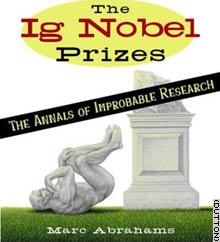An Indian who has been trying for 18 years to prove that he is alive, researchers who found that taxi drivers in London have a bigger brain than the average and the inventor of Murphy's Laws, which we all took seriously - won the Ignoble Prize for 2003 - the prize given to strange studies and those that usually cannot be repeated.
Avi Blizovsky
The award was also given to researchers who found that politicians have simple personalities, a Japanese inventor who studied a statue that appears to repel birds and an economist who documented annoying behaviors
The IgNobels, a play on words similar to the word ignoble which means shameful, contemptible, inferior (according to the dictionary attached to Ward) - are given annually by the humorous science magazine "Yearbook of Improbable Research" and several groups at Harvard and Radcliffe Universities to honor achievements that are impossible or not worthwhile repeat them.
"We try to make people laugh, but also think," said the editor of the yearbook, Mark Abrahams, who collects the award-worthy studies and presents them every year in Boston.
The Peace Prize is awarded to Lal Bihari from Uttar Pradesh in India "for a triple achievement". First, because he led an active life even though he is officially declared dead. Second, as a dead man he organizes a very lively campaign against bureaucratic persistence and greedy relatives, and thirdly - about the establishment of the Dead People's Association." said in a statement from the Ignoval Society on Thursday.
Bihari, who lives in Azamgarh, 220 kilometers southeast of Lucknow, was declared dead in 1976. It turns out that he tracked down thousands of Indians in his situation - victims of a scam in which tenants bribe officials to declare that their landlords have died so that they can inherit their property. Abrahams says that the Indian government initially refused to give the deceased a passport so he could attend the Ignoble award ceremony, but finally agreed last month to provide Bihari with the travel documents, but it was too late for Bihari to get a US visa. "The Indian government, which did not recognize him as alive, gave him a passport," Abrahams said, "but the US government, in all its perfection, efficiency and compassion, did not give him a visa." You would expect them to think a little about a person who has returned from the world of the dead."
The engineering award was given to Captain Edward Murphy, Air Force doctor John Paul Stapp and George Nichols, who in 1949 brought to the world Murphy's Laws "If something can go wrong, it will".
(As for Murphy, it turns out that when he said what he said "if something can go wrong, it will go wrong" he said this about technician Shlomiel - that anything that can be disrupted is disruptive, and he did not mean a general law. This is what Ami Ben Best said in an interview with Eli Goldschmidt and Dalia Neuman in one of the programs " A nightly talk that aired this month.” AB)
The medicine prize was awarded to a group from University College London for a case showing that the brains of London taxi drivers are more developed than those of ordinary citizens. Their report, published in the "Collection of Unpublished Papers" of the National Academy of Sciences in April 2000, showed that taxi drivers have an especially large hypothalamus gland, something related to spatial memory. "London taxi drivers must remember the city map and pass a complex orientation test in order to know their navigation skills.
A group from the Universities of Rome and Stanford won a psychology prize for their report, published in the serious scientific journal Nature in 1997, which showed that voters judge their politicians on two characteristics, compared to the five personality characteristics used in most social encounters.
The chemistry prize goes to Yukio Hirose of Kanazawa University in Japan for his research on a bronze statue that pigeons prefer not to approach.
John Trinkaus from the Ziklin School of Business in New York received the award for literature for over eighty reports about oddities, such as what is the percentage of drivers who fail to stop completely at a certain stop line, and what is the percentage of shoppers who exceed the allowed amount of products at express checkouts in a supermarket.

